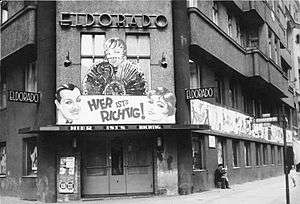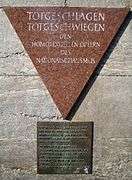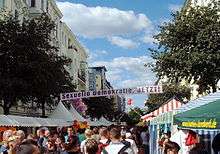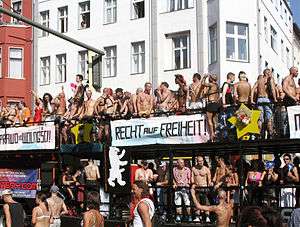LGBT culture in Berlin
Berlin, the capital city of Germany, has an active LGBT community with a long history. Berlin has many gay districts, with the biggest of them, Schöneberg, also being the first in the world.
History
Berlin has a long history of gay culture and influence on popular entertainment, and according to some authors, in the 1920s the city was the Gay Capital of Europe. In 1896 the world's first gay magazine started in Berlin, called Der Eigene ("The Self-Owning"). Magnus Hirschfeld, a German physician, founded the Scientific-Humanitarian Committee in May 1897 as a subset of Berlin's Institute for the Science of Sexuality. Not only was this organization the first of its kind in Germany, it was the first gay-rights organization in the world to lobby for the rights of gay, lesbian, and transgender people, with a focus on legal representation.
During the 1920s and 1930s the world's first gay village was in Berlin's Schöneberg. Gay and lesbian bars and nightclubs flourished, as did queer artistic expression through films, music, and print publications.[1] Cabaret singer Claire Waldoff and actress Marlene Dietrich lived and worked in Berlin's queer neighborhoods during this time. The first gay demonstration ever also started in Berlin in 1922.[2] The Reichstag nearly decriminalized homosexuality in 1929, before the year’s economic crash made a final vote impossible.[3] The rise of fascism in Germany in 1933 put increasingly pressure on Berlin’s homosexual community as officials closed bars such as Eldorado and banned gay publications, forcing Berlin’s homosexual men either underground or into camps.[4]
Homosexuality would only be decriminalized in 1969, which allowed for a much more open expression of gay and lesbian culture. The Homosexuelle Aktion Westberlin (HAW, Gay Action West Berlin) was the first modern gay organization in Germany, founded in 1971. Initially an all-male group, HAW protested many lingering anti-sodomy laws. In 1985, Berlin opened the world's first Gay Museum, otherwise known as the Schwules Museum, "a private institution dedicated to preserving, exhibiting, and discovering gay and lesbian history, art, and culture."[5] Contemporary Berlin actively promotes tourism in gay neighborhoods, including Schöneberg.
-

Der Eigene, the world's first gay magazine
-

Gay club Eldorado, 1932
-

Homosexuelle Aktion Westberlin, 1971
Geography
Berlin has many gay districts but Schöneberg is the main gayborhood of Berlin. Other gay districts are Prenzlauer Berg and Kreuzberg. The Memorial to Homosexuals Persecuted Under Nazism is in Tiergarten.
-
Memorial to Homosexuals Persecuted Under Nazism
-

Gay bear, Nollendorfplatz
-

Rainbow Column, Nollendorfplatz
-

Memorial "Pink Triangle", metrostation Nollendorfplatz
Economy
LGBT businesses in Berlin include bars, clubs, restaurants, and shops. The most of them are concentrated in Schöneberg, close to Nollendorfplatz.
Media
The lesbian magazine L-Mag and the gay male magazines Siegessäule and Blu are in Berlin. These three magazines include English texts. Schwules Museum is the world's first gay museum.
Politics
Klaus Wowereit has been the Governing Mayor of Berlin since the 21 October 2001 state elections. He is gay and coined the now famous phrase I'm gay, and that is a good thing."
Festivals
Berlin Pride is the gay pride parade in Berlin. Other prideparades ine Berlin are Kreuzberg Pride and Dyke March. Other festival are Folsom Europe and Easter in Berlin. Other famous festivals are Teddy Award and Hustlaball and the Yo!Sissy Queer Music Festival in July.
Notable residents
See also
Notes
- ↑ "Between World Wars, Gay Culture Flourished In Berlin". NPR.org. Retrieved 2016-02-22.
- ↑ Krauss, Kenneth (2004). The drama of fallen France: reading la comédie sans tickets. Albany: State University of New York. p. 11. ISBN 0-7914-5953-5.
- ↑ Ross, Alex (2015-01-26). "Berlin Story". The New Yorker. ISSN 0028-792X. Retrieved 2016-02-22.
- ↑ "Persecution of Homosexuals in the Third Reich". www.ushmm.org. Retrieved 2016-02-22.
- ↑ McKay, Barry. "Documenting Berlin's Gay History | Culture | DW.COM | 21.06.2004". DW.COM. Retrieved 2016-02-22.
Further reading
- Mel Gordon: Voluptuous Panic, The Erotic World of Weimar Berlin, Los Angeles 2000, ISBN 0-922915-58-X
- Manfred Herzer: Liebe und Vernunft der Urninge, Das schwule Berlin vom 18. Jahrhundert bis zum Jahr 1933, in: Berlin von hinten, Berlin 1981, ISBN 3-9800578-0-1, S.7-38
- Ross, Alex. "Berlin Story." The New Yorker. January 26, 2015.
- Hofmann, Sarah. “Berlin is gay, and that's a good thing.” DW. 26 Jun. 2015.
- Rollman, Hans. “Uncovering Queer History in 'Gay Berlin'.” Popmatters. 11 March 2015.

